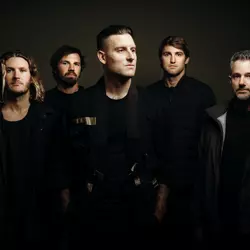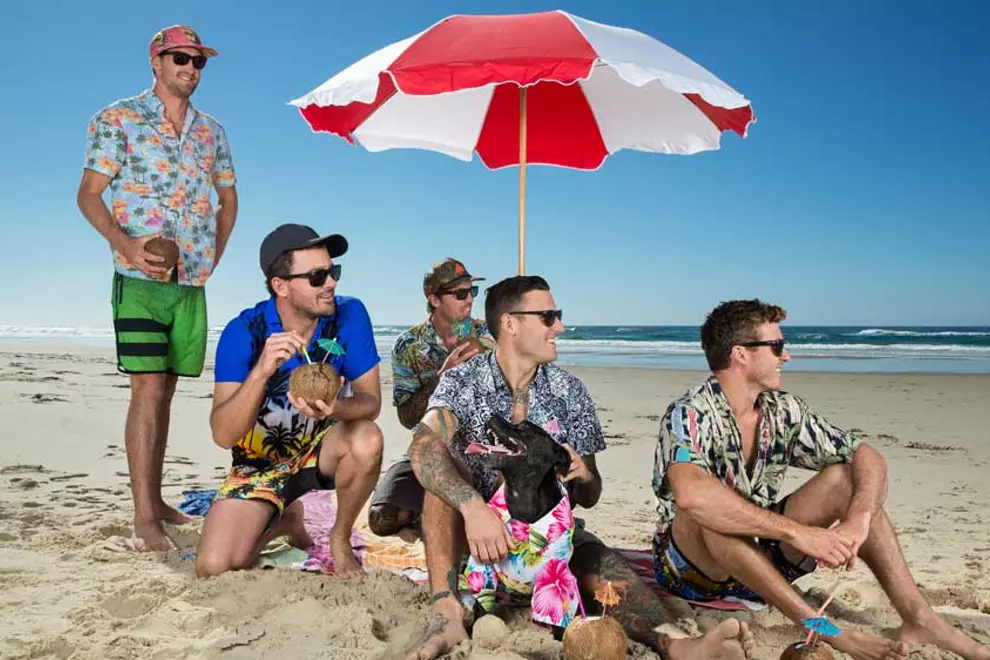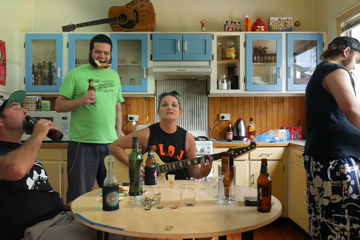 Parkway Drive
Parkway DriveGlobe-trotting, Gold-selling metalcore juggernaut Parkway Drive have been decompressing from what vocalist Winston McCall describes as their biggest scale tour thus far. During a recent month-long European festival run, he estimates the Byron Bay-bred outfit played to half a million people and garnered their most favourable audience reactions yet.
Therefore, when crafting their fifth album, it would have been a no-brainer to solely create familiar-sounding, even homogenised mosh-pleasing anthems. Instead, although the aptly titled Ire contains many elements to which fans have become accustomed, the quintet actively sought to create a wider spectrum of sounds.
"We learnt a while ago that heaviness works far more when it's played off with space," McCall tells The Music while sitting in a Newtown pub. "It's like when you hear a jackhammer; eventually it becomes white noise. It's a really abrasive sound, but eventually you stop hearing jackhammer and you just hear something going off, then it stops and you're like, 'Oh, whatever.' But when you have a firecracker go off right next to your ear after complete silence, it stuns you. So we'd rather work on that concept than the idea of just being completely brutal the whole time. Because if we kept on the trajectory that we originally had and created another evolution of the sound that we were already doing it would have started going into a territory which we didn't want to necessarily delve into, which was down-tuning even more, the vocals becoming more unintelligible, and it becoming an even thrashier kind of thing.
"The very easy thing that you see bands do is they want to create, want to reach the next level of whatever, and all of a sudden they grab really clean, Auto-Tuned vocals and just jam them on in there."
"We found that rather than necessarily just trying to go heavier, faster and tack on more melody, we restructured the whole way we wrote things. Which meant simplifying a lot of stuff... A lot of the drum beats are way simpler than anything we've done before. There's a lot more gaps where the singing isn't, which means the guitars shine way more in a lot of parts. So it was actually quite a simple thing in that regard, but it wasn't simple for us because we never learnt how to do that in the first place. We just started with the goal of going mental the whole time, so it was literally reassessing the entire way we created music."
Don't miss a beat with our FREE daily newsletter
This was indeed a lengthy undertaking. Parkway Drive spent two-plus years penning the album, keeping their creative detour under wraps. "It's the first time that we have an unknown quantity in the band, which is kind of exciting," the frontman enthuses. "It's intimidating, but it's exciting." For instance, single, Vice Grip, complete with its thrill-seeking video, was lambasted by some for arena-sized ambitions.
Perhaps the album's most potentially jarring point of difference though is McCall's foray into previously untapped vocal territory. At the time of our conversation, he's keeping mum on the mystery producer ("You're not going to expect it when it comes out") who helped coach him through this development. The singer says Ire's vocals were written with considerable theory in mind. Although the members are uncertain how to describe them, McCall wished to ensure the sparingly utilised, unique, almost semi-clean tones sidestepped pop-punk-style choruses. Factoring in not wanting to become another "laptop metal band", being able to properly replicate the material during shows was also crucial.
"The very easy thing that you see bands do is they want to create, want to reach the next level of whatever, and all of a sudden they grab really clean, Auto-Tuned vocals and just jam them on in there. It's just the same band, but all of a sudden there's fucking these clean vocals which never get done properly live anyway. That's not what we wanted the band to actually sound like, so we had to figure out what capacity we wanted to use that in.
"It was literally figuring out what worked, what was the right level of pitch to put in and what was the right level of gravel and try to put in what we wanted to create when it came to the actual emotion. So he [their producer] was a massive help in all of that. It was a really big challenge, and I did a lot of training for this. To hit any kind of pitch, I had to literally learn how to sing, so it was like a year of doing training, because I'd never learnt any vocal technique at all. It worked for learning how to make sure I could scream better as well. But it wasn't even just like the singing, the bits where there's any kind of pitch, it was the fact that before this, if you listen to any other record there's the screams in whatever high or lows, and then there's like talky parts, and that's it. There's nothing in between.
"Being able to watch a kid come to a show, be there with like-minded people … scream their lungs out is one of the most satisfying things I've ever felt."
"Doing all that stuff and having it actually be effective without going either too heavy or too soft or come off too cheesy, was a really big thing to actually be able to do. So when it came to the actual hitting pitch it was nice to be able to go into the studio and know what pitch I'm supposed to be hitting on the scream or whatever, and actually know what the hell I'm doing."
As the perpetually on tour band prepares to translate Ire material for enormodomes and festival stages worldwide, the 34-year-old remarks that much of Parkway Drive's audience has grown up with them over the past decade-plus. "It used to be the case where we'd play an underage gig, and it would be three times bigger than the over-age gig. Now it's the complete opposite."
But he also believes there may be a tangible quality that the uninitiated, such as a teenager just beginning to explore this heavy music caper, can latch onto. McCall is relishing the prospect of converting a whole new slew of youths yet to witness their live show because they haven't toured Australia for almost two years. "Every time we do play for younger kids I'm not sure what they're getting out of it, if they're connecting with the vocals or just the intensity, but I'm more than happy to make no connection other than it being the music, and have them be there and be able to have an outlet. Anything more than that is just a bonus. Being able to watch a kid come to a show, be there with like-minded people, feel safe, be able to go absolutely mental and scream their lungs out is one of the most satisfying things I've ever felt... There are kids that will come to a show and they're pouring more out of themselves than you are on stage. It's amazing to see."
He reiterates how much they embraced creating the new full-length. "I'm so looking forward to playing it, and I really think there's so much more we can do creatively with this band. But whether or not we get the chance to do that is up to people listening to it. At the same point in time, I don't think this is straying so far away that we become a completely different band. The whole idea of this evolution was not to destroy Parkway and create band X, or a new one. It was literally to start redefining what Parkway actually means."

















